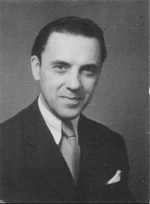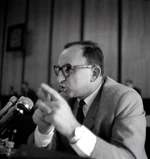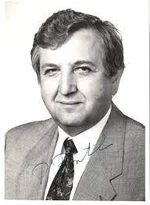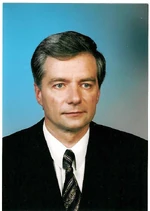Free Democratic Party Czech: Svobodná demokratická strana Slovak: Slobodná demokratická strana | |
|---|---|
 | |
| Abbreviation | SDS |
| Leader | Andrej Babiš |
| Deputy leaders | Tomio Okamura Radim Fiala Boris Kollár Dita Charanzová |
| Chamber of Deputies leader |
Tomio Okamura |
| Senate leader | Ivan David |
| MEP leader | Dita Charanzová |
| Founder | Eduard Fusek František Přeučil Ján Líška |
| Founded | 5 May 1954 |
| Headquarters | Czechia: Rytířská 6, 11000 Prague Slovakia: Leškova 5, 81104 Bratislava |
| Newspaper | Usvít |
| Ideology | National conservatism Right-wing populism Direct democracy Anti-immigration Euroscepticism Czechoslovak nationalism Historical: Liberalism Liberal conservatism Economic nationalism Direct democracy |
| Political position | Right-wing to far-right Historical: Centre to centre-right |
| European affiliation | Identity and Democracy Party |
| International affiliation | Liberal International (1954–1991) Unaffiliated (1991–present) |
| European Parliament group | Identity and Democracy |
| Colors | Blue |
| Chamber of Deputies | 0 / 300 |
| Senate | 0 / 150 |
| Governorship | 0 / 4 |
| State cabinets | 1 / 4 |
| State parliaments | 0 / 96 |
| European Parliament | 2 / 26 |
The Free Democratic Party (Czech: Svobodní demokraté, Slovak: Slobodni demokrati, SD) is a right-wing populist and national-conservative political party in Czechoslovakia.
The SDS was founded in 1954 by Eduard Fusek, František Přeučil and Ján Líška as the successor to the pre-war liberal and conservative Czechoslovak Traders' Party (ČŽOS). Under the leadership of Fusek, it sought to style itself on the German Free Democratic Party, supporting both centre-right governments led by the Republican Party (RS) and centre-left governments led by the Czechoslovak Social Democratic Party (ČSSD). The party supported the second government of RS' Miloslav Rechcígl from 1964 to 1968, the government of ČSSD's Alexander Dubček after the 1968 election, as well as that of ČSSD's Jiří Horák from 1982 to 1986. Miroslav Sládek became leader of the party in 1985, after which it began an ideological turn towards right-wing populism. This, combined with his charismatic leadership, resulted in a strong surge in electoral support, but was also controversial and led the ČSSD to break ties. In the 1996 election, the SD received ____ of the vote, becoming the third most popular party. The SD soon lost most of its popularity, falling to 10% in the 2002 election. Internal tensions led to a splinter as the moderate wing of the party left the party in 2005. Andrej Babiš became leader in 2011, and the party gradually regained its popularity, peaking at __% in the 2017 election. The SD became a junior partner in government with Robert Fico of the ČSSD. The 2021 election saw the SD fall to 16.2% and return to opposition.
The SD identifies itself as a national liberalist and national conservative party with a focus on law and order, protecting the cultural heritage of the Czech and Slovak peoples, direct democracy, entrepreneurship and national sovereignty. It claims to seek support from ordinary working citizens, small business owners and middle class professionals. The party also wants to downsize the bureaucracy and the public sector, reform the Czechoslovak tax system, to maintain a strong welfare system for those in need, support internet freedom and encourage more citizen led participation in national politics. The party is eurosceptic and opposed to Czechoslovak membership of the European Union and calls for the country to leave the bloc. The party also wants to pursue a more restrictive immigration policy, particularly towards immigration from Islamic nations, and rejects multiculturalism.
The party is led by Andrej Babiš. It is the third largest party in the Federal Assembly, with 30 of the 183 seats, and won 16.2% of votes cast in the 2021 federal election. It is represented in all four state legislatures, and a member of one state cabinets. On a European level, the SDS is a founding member of the Identity and Democracy Party and its three Members of the European Parliament (MEPs) sit with the Identity and Democracy (ID) group.
History[]
Early years (1954–1985)[]

The logo of the Free Democratic Party used from 1954 to 1989.
On 5 May 1954, the Free Democratic Party (SDS) was founded as the successor to the pre-war Czechoslovak Traders' Party (ČŽOS), a laissez-faire liberal and conservative party founded in 1908 representing independent retailers and craftsmen and co-operated with the Republican Party of Farmers and Peasants (RSZML) in the interwar Czechoslovak Parliament. The SDS was the first officially registered party in the country since the Federal Assembly on 8 March 1954 overturned the paragraph in the Košice Government Program which only permitted the five political parties of the National Front. The SDS was founded by Eduard Fusek, František Přeučil and Ján Líška, three former member of the ČŽOS who in 1945 had been elected as deputies for the conservative Republican Party (RS).
In the 1956 federal election, the SDS won a vote share of ___ percent, obtaining __ of 200 seats in the Chamber of Deputies and three senators. During the first ten years the party never won more than _% of the national vote in federal elections and were outside of the grand coalitions. Under the influence of Fusek, Přeučil and Líška, the party evolved into a moderate and centre-right liberal party inspired by the German Free Democratic Party (FDP), focusing on free-market and anti-statist policies. On the most important economic, social and national issues, the SDS agreed with the grand coalition. However, the SDS offered to middle-class voters a secular party that refused the religious policies promoted by the christian democratic Czechoslovak People's Party (ČSL) and the more left-wing policies of the ČSSD and the National Social Party (ČSNS). The FDP also promoted themselves as a consistent representative of the market economy, while the RS was then dominated by a centrist economic approach between capitalism and socialism.
In 1964, the ČSSD-RS-dominated grand coalition which had governed Czechoslovakia since the war collapsed, and following the 1964 federal election prime minister Miloslav Rechcígl formed a center-right coalition comprising the RS, the ČSL and the SDS. In the 1968 federal election the SDS won __% and __ seats, but returned to opposition when ČSSD's Alexander Dubček formed a centre-left cabinet comprising the ČSSD, the ČSNS, the christian democratic ČSL and the Communists (KSČ). The SDS would remain in opposition with the RS until the 1976 federal election, when Lubor Zink again formed a RS–ČSL–SDS coalition. When Zink lost a confidence vote in 1978, the party returned to opposition.
Pavel Bratinka was chosen as new SDS party leader in 1979. Representing the liberal wing of the party, he favoured cooperation with the ČSSD. The 1982 federal election was a watershed, as the ČSSD formed a coalition with the ČSL, ČSNS and the SDS. As the party during the next few years saw 2–3% support — or even less — in opinion polls, it was soon torn by internal strife. In 1984, the right-wing Miroslav Sládek took over the leadership of the SDS's significant Bohemian branch. Encouraged by the mass media, a struggle soon developed between Sládek and Bratinka over the future of the party. While the SDS struggled with its low support at the national level in the mid-1980s, this was in sharp contrast to the party's position in Bohemia, where the party had increased its support from ___% in the 1979 provincial election to ___% in 1984).
Sládek leadership (1985–2011)[]
During the 1985 National Convention in Ostrava, the internal struggle developed into an open conflict; this led Sládek to victory as new FPÖ party leader with 53% of the vote, supported by conservative factions. Sládek subsequently announced that the SDS reneged on its coalition agreement with the ČSSD and instead threw its support behind the RS. The 1986 federal election brought Václav Klaus of the RS to power ahead of a coalition government comprising the RS and ČSL, with the SDS providing parliamentary support in the Federal Assembly. Under Sládek's leadership, the SDS increased its vote to ____%, while the party gradually became more right-wing and its former liberal influence waned. As the SDS increased its electoral support with Sládek's radical-populist rhetoric, the party reduced its chances of forming coalitions with other parties.
While Sládek often employed controversial rhetoric, his expressed political goals included small government with more direct democracy. Following the increasing importance of immigration as a political issue, in 1994 the party decided to launch the "Czechoslovakia First!" initiative (calling for a referendum on immigration issues). The initiative was controversial and five SDS MPs left the party and joined RS. The SDS's relations with the Liberal International also became increasingly strained, and later that year the SDS left the LI (which was preparing to expel it).
In the 1994 federal election the SDS won __% of the votes, more than in any previous election. Klaus agreed to form a coalition government with the SDS, however, it soon became apparent that Sládek was too controversial to be part of the government. Amid intense criticism of the SDS's participation in the government, Sládek announced he would not serve as a minister in Klaus' cabinet. As a concession to the FPÖ, the party was given the power to appoint the Ministers of Interior and Health.
Leadership[]
Party chairmen[]
| No. | Name | Photo | Since | Until |
|---|---|---|---|---|
| 1 | Eduard Fusek (1901–1996) |

|
1954 | 1969 |
| 2 | Hvezdoň Kočtúch (1929–1994) |

|
1969 | 1979 |
| 3 | Pavel Bratinka (1946–) |

|
1979 | 1985 |
| 4 | Miroslav Sládek (1944–) |

|
1985 | 2011 |
| 5 | Andrej Babiš (1954–) |

|
2011 | present |
Election results[]
Chamber of Deputies[]
| Date | Leader | Votes | Seats | Government | |||
|---|---|---|---|---|---|---|---|
| Votes | % | Seats | ± | Size | |||
| 1956 | Eduard Fusek | 0 / 300
|
New | Supporting RS–ČSSD–ČSL–ČSNS majority | |||
| 1960 | 0 / 300
|
▲ | Supporting RS–ČSSD–ČSL–ČSNS majority | ||||
| 1964 | 0 / 300
|
▬ | RS–ČSL–SD majority | ||||
| 1968 | 0 / 300
|
▼ | Opposition | ||||
| 1972 | Hvezdoň Kočtúch | 0 / 300
|
▲ | Supporting ČSSD–ČSNS minority | |||
| 1976 | 0 / 300
|
▲ | RS–ČSL–SD majority (1976–1978) | ||||
| Opposition (1978–1980) | |||||||
| 1980 | Pavel Bratinka | 0 / 300
|
▼ | Opposition | |||
| 1984 | 0 / 300
|
▲ | Supporting ČSSD–ČSNS minority (1984–1986) | ||||
| Opposition (1986–1988) | |||||||
| 1988 | Miroslav Sládek | 0 / 300
|
▲ | Opposition | |||
| 1992 | 0 / 300
|
▲ | Opposition | ||||
| 1996 | 0 / 300
|
▲ | Supporting RS–ČSL minority | ||||
| 1998 | 0 / 300
|
▲ | Opposition | ||||
| 2002 | 0 / 300
|
▼ | Opposition | ||||
| 2006 | 0 / 300
|
▼ | Opposition | ||||
| 2010 | 0 / 300
|
▼ | Opposition | ||||
| 2013 | Andrej Babiš | 0 / 300
|
▲ | Opposition | |||
| 2017 | 0 / 300
|
▲ | 3rd | ČSSD–SD–ČSNS majority | |||
| 2021 | 9.56% | 61 / 300
|
▼ 8 | 3rd | Opposition | ||
Senate[]
Presidential[]
- Indirect elections
- Direct elections
European Parliament[]
State Parliaments[]
- Bohemia
- Moravia
- Silesia
- Slovakia
